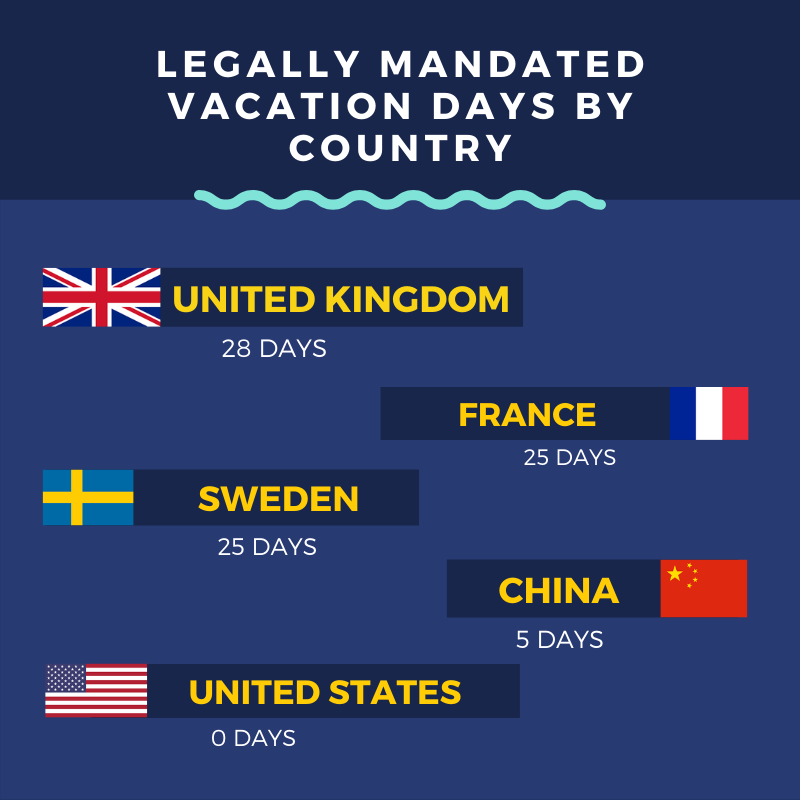You are an ambitious, hard working employee with designs on rising up the company ranks and one day getting that plush office with a downtown view. You work 60+ hours a week, and even when you’re not in the office you are checking emails or taking phone calls with clients. Your company provides paid vacation days, but heaven forbid you take precious time away from your responsibilities and potentially allow some hotshot upstart to replace you in the corporate pecking order.
Sound familiar?
If so, you are not alone. The average employee in the U.S. only uses about half of their paid vacation time. For many American employees and employers alike, vacations are nothing more than an unnecessary luxury. We tend to believe that job productivity is directly correlated to the amount of hours worked, thus taking time off would only derail your chances of success within a company. This, however, is an outdated notion that could not be further from the truth. Vacations are not only a great way to unwind and explore new places, they also provide very important physical and mental health benefits that will actually help improve your job performance. That’s right, taking vacations is actually beneficial to your career trajectory, contrary to what U.S. corporate culture will have you believe. And therein lies the problem.
U.S. corporate culture is not vacation friendly.
While other wealthy countries such as the United Kingdom, France and Sweden put a strong emphasis on providing significant time off to its workforce, the United States falls far behind in that regard. In fact, as per the
Fair Labor Standards Act (FLSA), U.S. companies are not legally mandated to provide
any vacation days or holidays to its employees. That makes the United States the only advanced economy in the world in which businesses are not required to do so. By comparison, companies in the UK must provide at least 28 vacation days to its employees, and even China, a country not known for its favorable treatment of workers, requires companies to provide at least five days of vacation time. According to this
2013 CEPR study, nearly one in every four Americans receive no paid vacation and no paid holidays. In addition, there is a significant gap between the vacation time allotted to low wage employees, who are given an average of four days a year, compared to high wage employees, who average 14 days.

Even more eye-opening is the number of Americans leaving their earned vacation days on the table. A
2018 study by the US Travel Association shows that 27% of all PTO (Paid Time Off) went unused in 2018. This happens for a multitude of reasons, including employees not wanting to return to a pile of work, and in many cases, companies subtly (or not-so-subtly) discouraging employees from taking all their earned time off. This ever-present spectre of corporate pressure creates a culture of “work martyrs” - employees who will sacrifice their own health and happiness for the sake of the company in fear of being perceived as replaceable by their superiors. Contrary to popular thought, however, the desire to impress your bosses by showing how dedicated you are could very well have the opposite effect than intended.

Although folks working longer hours may sound like a benefit to employers, that is not necessarily the case. Research has shown that employees’ productivity increases when they take advantage of their PTO. Not taking the time to rest and recharge can lead to exhaustion, illness, and ultimately lower job performance, and businesses stand to benefit from having well rested, focused employees. Some companies such as Dropbox and General Electric even offer unlimited paid time off in order to attract high-value candidates. While the potential for employees to abuse such a liberal system is a valid concern, these companies have found that the freedom to determine your own vacation time produces a happier, more engaged workforce.
Bottom line: Vacations are good for everyone.
If you are healthy and well-rested, you will likely be more valuable in the workplace. Burnout is very real and if not treated as such it can negatively impact your productivity and well-being. Many people tend to put off scheduling a vacation until they feel it is “deserved”, but statistics show that taking time off to recharge is a necessity, not a luxury.

Not all vacations, however, are created equal. Using your time away from work to simply run errands, surf the internet or binge watch Game of Thrones will not have the same effect as truly unplugging from your everyday routine and dedicating time to yourself. Additionally, a poorly planned vacation can be just as stressful and detrimental as not taking one. Handle all the annoying specifics such as booking travel, transportation and activities ahead of time. Go online and research
restaurants, landmarks, and nightlife at least a month in advance. Consider visiting an all-inclusive resort or joining a
travel club to help loosen the burden of having to plan every aspect of your trip. Dealing with with these details during your time off will likely result in higher levels of stress and lower energy when you return to work, thus defeating the purpose of taking a vacation to begin with.


